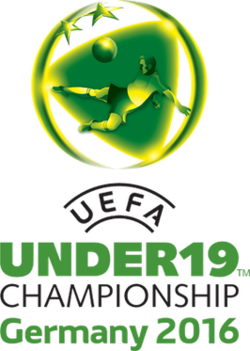2016 UEFA European Under-19 Championship
| U-19-Fußball-Europameisterschaft 2016 | |
|---|---|
 |
|
| Tournament details | |
| Host country |
|
| Dates | 11–24 July 2016 |
| Teams | 8 (from 1 confederation) |
| Venue(s) | 10 (in 9 host cities) |
| Final positions | |
| Champions |
|
| Runners-up |
|
| Tournament statistics | |
| Matches played | 16 |
| Goals scored | 55 (3.44 per match) |
| Top scorer(s) |
(6 goals) |
| Best player |
|
The 2016 UEFA European Under-19 Championship was the 15th edition of the UEFA European Under-19 Championship (65th edition if the Under-18 and Junior eras are included), the annual European international youth football championship contested by the men's under-19 national teams of UEFA member associations. Germany, which were selected by UEFA on 20 March 2012, hosted the tournament between 11 and 24 July 2016.
A total of eight teams competed in the final tournament, with players born on or after 1 January 1997 eligible to participate.
Same as previous editions held in even-numbered years, the tournament acted as the UEFA qualifiers for the FIFA U-20 World Cup. The top five teams qualified for the 2017 FIFA U-20 World Cup in South Korea as the UEFA representatives. This was decreased from the previous six teams, as FIFA decided to give one of the slots originally reserved for UEFA to the Oceania Football Confederation starting from 2017.
The national teams from all 54 UEFA member associations entered the competition. With Germany automatically qualified as hosts, the other 53 teams contested a qualifying competition to determine the remaining seven spots in the final tournament. The qualifying competition consisted of two rounds: the qualifying round, which took place in autumn 2015, and the elite round, which took place in spring 2016.
The following eight teams qualified for the final tournament:
Note: All appearance statistics include only U-19 era (since 2002).
The final draw was held on 12 April 2016, 18:00 CEST (UTC+2), at the Mercedes-Benz Arena in Stuttgart, Germany. The eight teams were drawn into two groups of four teams. There was no seeding, except that hosts Germany were assigned to position A1 in the draw.
The tournament was hosted in ten venues:
Each national team had to submit a squad of 18 players.
A total of 6 referees, 8 assistant referees and 2 fourth officials were appointed for the final tournament.
...
Wikipedia
